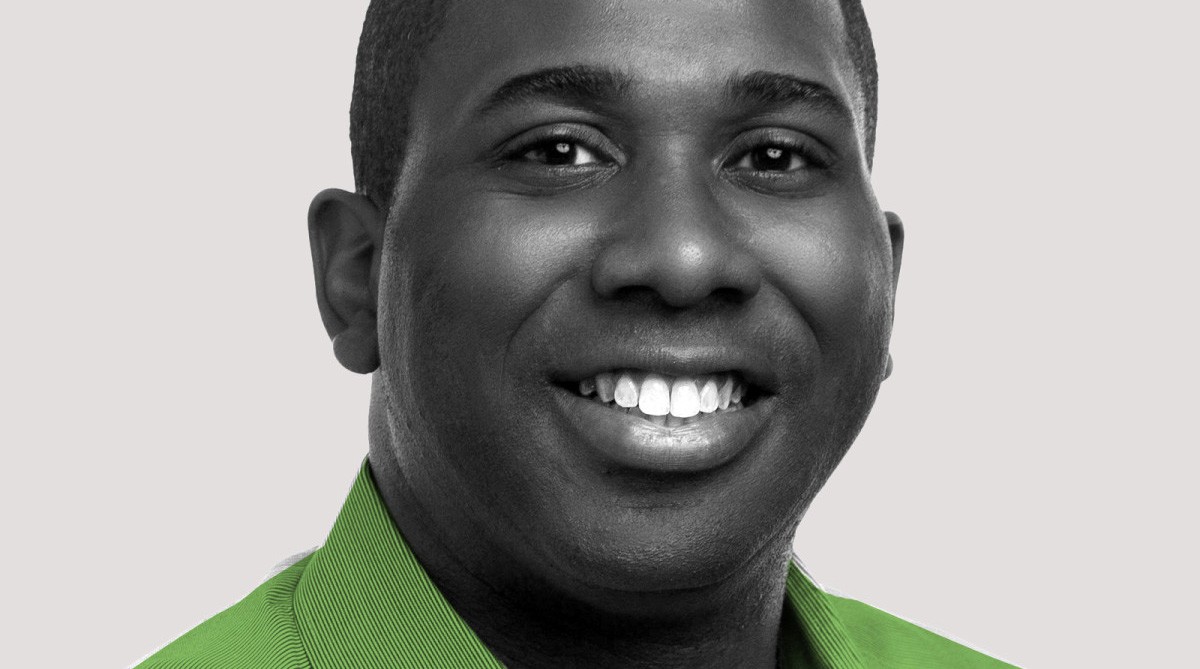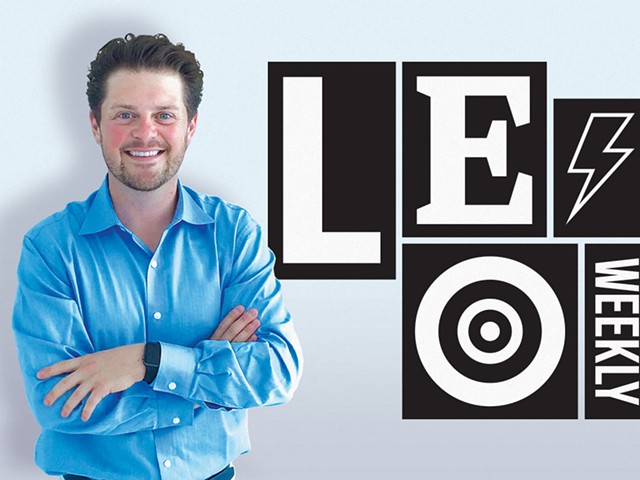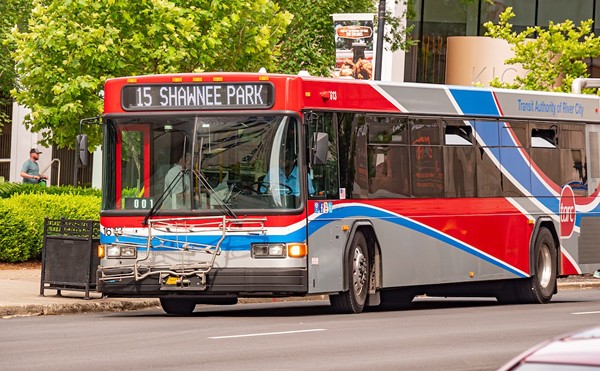Soon after he won re-election for his third and final term, Mayor Greg Fischer and his administration started a series of forums and events that touch on issues such as unconscious bias, immigration, redlining and relations between residents and police. The issues are fraught, but the vibe is a bit kumbaya-ish. And echoing that vibe, Fischer and his team gave the initiative a vague, non-threatening moniker, “Lean into Louisville,” even though it’s really akin to “Louisville’s Conversation About Race.”
Another, more informal conversation about racial issues is happening in the city.
And, it’s less polite.
Officials at Simmons College, the city’s only historically-black college, said it was a “clear example of white privilege” that nearby Spalding University bought and built an athletic field on land Simmons had wanted. Rev. Kevin Cosby, Simmons’ president and St. Stephen Church’s pastor, recently hosted the first conference for the national group American Descendants of Slavery at the church. It featured a blunt denunciation of the entire field of 2016 Democratic presidential candidates for not being more supportive of reparations for descendants of enslaved black Americans. Josh Poe, a housing policy activist, says Louisville’s current housing policies have the potential to be “every bit as devastating as redlining and urban renewal.”
Essentially, Fischer is pushing the city to be more woke on racial issues, but Cosby and Poe want to see more works — policies to aggressively and immediately combat racial inequality.
I think that woke-vs.-works dynamic and the inherent tension in those approaches will be a defining conflict in political and policy debates here and other areas dominated by Democrats.
And, it might become the defining conflict.
What do I mean by woke vs. works? Left-leaning people in Louisville and across the country are increasingly “woke” — deeply concerned about racial inequality. The heightened focus on lifting up West Louisville and addressing income and wealth disparities between white and black Louisvillians from the city’s business, philanthropic and political leaders is a microcosm of the broader conversation that has happened among Democrats across the country since the 2014 protests in Ferguson, Missouri, and the emergence of Black Lives Matter.
“Woke” is sometimes used as a pejorative, to mock white liberals who suddenly take more interest in racial issues. But I’m not using that term in a negative way. Wokeness is leading to more frank and public discussions of racial issues, including the events Fischer and his administration are participating in. And in my view, those conversations can add real value, because they help spur real policy action. It’s hard to imagine that without such heightened discussion of racial inequality in Kentucky that Gov. Andy Beshear would make restoring voting rights to nonviolent felons who complete their sentences a first move as governor, Charles Booker would explore a run for U.S. Senate, the YMCA would open a new facility on West Broadway or the county prosecutor would decide to no longer prosecute possession of small amounts of marijuana.
At the same time, more knowledge and discussions can have their limits.
“Do we really need new maps of the segregation by race, female-headed households, persons with disabilities and Latinx households? Spoiler alert — Not Much Has Changed,” The Metropolitan Housing Coalition wrote in its new report on city housing inequalities.
And on seemingly intractable problems, the effectiveness of wokeness without fairly aggressive works is limited. Many debates around various Jefferson County Public Schools policies circle around class and race — everyone knows that having some schools with large populations of low-income children is not ideal, but more comprehensive efforts to integrate schools by class and income would be controversial. Residents probably didn’t want pictures on the front page of the newspaper showing a crowd of mostly black young people in line for hours to get free Kentucky Kingdom passes, in part, to use the water park there. But residents also didn’t want to pay higher taxes, as Fischer had called for, to keep open public swimming pools. Much of the city budget is spent on policing. Is there any appetite for reducing some of that to free up money to build affordable housing?
Again, this is not unique to Louisville.
Chicago elected Lori Lightfoot mayor earlier this year, as the first black woman and first openly-gay person to run America’s third-largest city. City teachers greeted her ascendancy by striking — they wanted (and won) higher pay and more spending on education and didn’t seem to care that she was demographically different than her predecessors.
Young black activists weren’t that interested in Kamala Harris’s presidential campaign — they preferred the more full-throated liberalism, even on racial issues, of Bernie Sanders and Elizabeth Warren.
New York Mayor Bill de Blasio rose to power with an ad highlighting his biracial son’s worries that the police stop-and-frisk policy unfairly targeted minorities. But as de Blasio nears the end of his tenure, there are complaints he has not done enough to integrate schools.
This tension is complicated and fraught, in part, because these issues are complicated. There are no clear villains — Cosby and Fischer are both, in my view, committed to addressing racial inequality. It doesn’t divide neatly along racial lines: Fischer and his administration have plenty of staffers and allies who are black. Poe is white. These issues aren’t entirely about race and, at times, have a deep class component. Fischer’s administration has generally pushed a “rising tide” approach, bringing more investment will boost the city economy and help people of all races. That’s not necessarily wrong, and Fischer has also strongly advocated for programs that target black people and heavily-black areas. And a more direct, forceful conversation about the city’s racial challenges that Cosby wants has the potential for backlash — after all, 67% of Louisville’s residents are white.
This woke-and-works dynamic is about to become even more relevant in Louisville. The 2020 elections for Metro Council seats and 2022 race for mayor could reshape the city’s leadership, with Fischer term-limited and unable to run again and at least two Democratic city council members (Brandon Coan and Barbara Sexton Smith) leaving their seats. Jecorey Arthur, one candidate for Sexton Smith’s district, which includes parts of Russell and Smoketown, bluntly told The Courier Journal he was running to “fix black Louisville” and “people are putting Band-Aids on issues that require surgery.”
Developer Gill Holland, Council President David James, top Fischer adviser Mary Ellen Wiederwohl and Sexton Smith are among those rumored to be thinking about running for mayor. Woke vs. works is going to be a big factor as that race shapes up too. Louisville’s government has long been dominated by white men (Jerry Abramson and Fischer) who are racially-conscious but fairly-moderate ideologically and focused on bringing more investment to the city. James, who is black, and Sexton Smith and Wiederwohl would signal a different leadership just based on their demographic characteristics. Holland has a certain woke credential, too, from his work in redeveloping Portland and NuLu.
Just running on their biographies likely won’t be enough. Louisville is having a conversation about race, but that conversation is nearing its end — there is broad agreement that a lot more should be done to try to address racial disparities here. The city is woke — the big question is now what that means in terms of works. •






